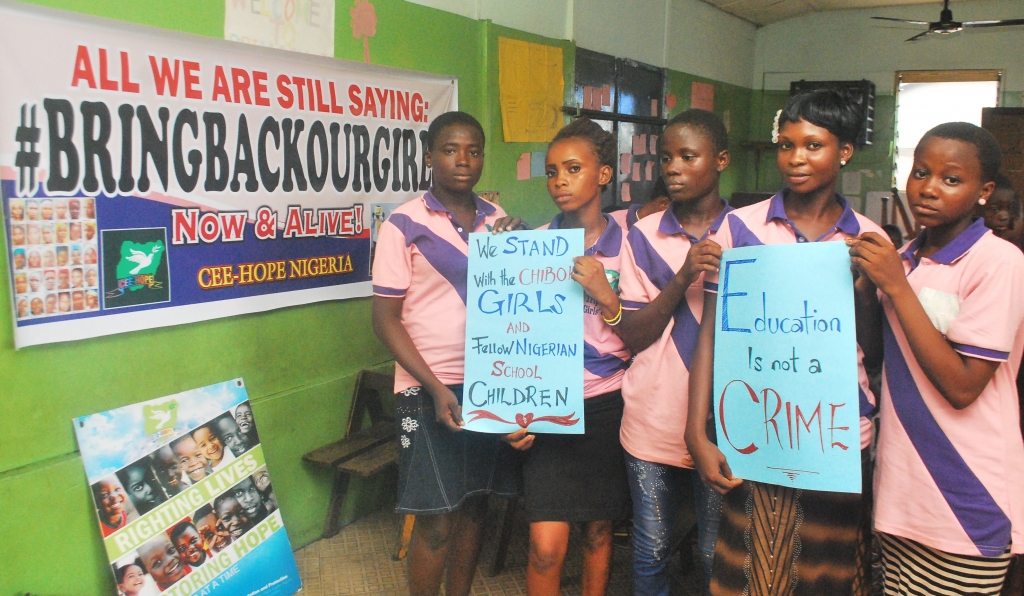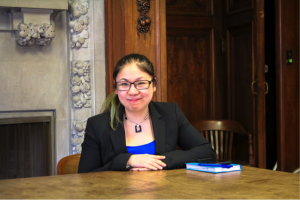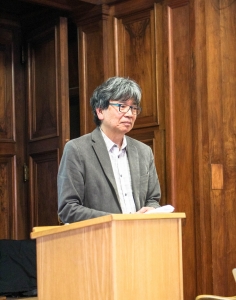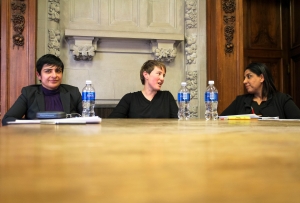By James Yap, CLAIHR President
This post originally appeared on the blog of the Business and Human Rights Resource Centre (BHRRC).
Momentum continues to gather for transnational human rights litigation brought in Canadian courts against Canadian corporations, with the release on February 28 2020 of the Supreme Court of Canada’s decision in Nevsun Resources Ltd. v. Araya.
The key legal takeaways from the decision can be summarized as follows:
• There is no independent act of state doctrine[1] in Canadian common law (unanimous)
• Violations of customary international law may be
civilly actionable in Canadian courts (5-4 majority)
• Rules of customary international law that are binding
on individuals are also binding on corporations (5-4 majority)
The decision looks to be foundational in terms of
the treatment of customary international law in Canadian common law courts.
This and certain other aspects of the decision, notably the ruling on corporate
liability under international law, may also have implications further afield.
Background
The claim was filed in November 2014 in the Canadian
province of British Columbia by Eritrean nationals who have fled Eritrea and
are living abroad as refugees. They allege that as part of a collaboration between
the defendant Canadian mining company, Nevsun Resources, and the Eritrean
government, they along with a large number of compatriots were forced to work on
the construction of the Bisha mine in Eritrea. They alleged that perceived disobedience
was often met with severe punishments such as arbitrary detention and torture.
The situation at the Bisha mine has received
attention from international organizations, with Human
Rights Watch and a United
Nations Commission of Inquiry both reporting on the use of forced labor there.
The company denies all allegations.
The plaintiffs plead various conventional common
law torts such as negligence, conspiracy, and battery. But in a novel argument, the plaintiffs also
plead that the company’s actions are civilly actionable as breaches of
customary international law rules prohibiting slavery, forced labor, torture,
crimes against humanity, and cruel, inhuman, and degrading treatment. Customary
international law is said to be automatically incorporated into domestic law
through the common law, and so the plaintiffs argue that breaches of these
international law rules must give rise to a civil remedy under domestic common
law.[2]
The company filed a motion to strike the novel
claims. It also filed two other motions to dismiss the lawsuit in its entirety:
the first on the basis of the forum non
conveniens doctrine, arguing that Eritrea was a more appropriate forum for
the litigation than Canada, and the second on the basis of the act of state
doctrine. The act of state doctrine is a rule that prevents courts from ruling
on matters that engage the lawfulness of another sovereign state’s conduct. Although
recognized in other common law jurisdictions such as the UK, the US, and
Australia, it has never been applied in Canada.
The company lost all three motions at the British
Columbia Supreme Court, and appealed to the British Columbia Court of Appeal,
where it lost again. The company then appealed to the Supreme Court of Canada
on the act of state and customary international law motions. It did not seek
leave to appeal the forum non conveniens
decision, the lower courts having concluded that there was a real risk of an
unfair trial in Eritrea on the evidence, inter alia, of several former Eritrean
judges who had fled their country and were living abroad as refugees.
The
Decision
The Supreme Court of Canada dismissed both motions
under appeal in February 2020. A five-judge majority, led by Justice Abella, noted
a line of British cases identifying the act of state doctrine as consisting of
two distinct components: a choice of law rule requiring courts to recognize the
validity and effect of foreign laws in foreign territory, and a rule of
judicial restraint from adjudicating matters intruding too far into the realm
of interstate relations (para. 35). The majority simply reasoned that Canadian
law already had equivalent rules governing choice of law and judicial restraint.
The act of state doctrine was thus superfluous and had no place in Canadian law,
and therefore posed no bar to the plaintiffs’ claims (paras. 44-59).
On the customary international law claims, the
majority affirmed that customary international law forms part of the law of
Canada (paras. 94-95), and that the norms invoked by the plaintiffs are part of
customary international law, and perhaps even jus cogens[3]
(paras. 100-03). The majority also affirmed that rules of customary
international law can also bind corporations (paras. 104-13, 185).
The majority further accepted that existing
conventional common law torts may be inadequate to redress wrongs so severe
that they breach core norms of customary international law (para. 129). For
instance, an award of punitive damages under conventional tort law may be an inadequate
response where serious international law violations such as those alleged here are
concerned (para. 126).
The majority thus accepted that the plaintiffs’
argument to recognize new nominate torts based on customary international law
claims could very well succeed at trial. Further, they also observed that in
the alternative to recognizing new nominate torts, a case could be made for “a
direct approach recognizing that since customary international law is part of
Canadian common law, a breach by a Canadian company can theoretically be
directly remedied based on a breach of customary international law.” (para.
127) The claim was therefore allowed to proceed (para. 132).
Two other judges led by Justice Brown issued a
partial dissent, in which they agreed with the majority’s conclusions on the
act of state doctrine, but would have dismissed the customary international law
claims.
Among other things, Justice Brown would have held
that corporations cannot be bound by international law (paras. 188-91). Justice
Brown criticized Justice Abella’s majority reasons, inter alia, for citing only one authority on this point. However he
himself cited only two, which themselves offered weak support. His first
authority cautioned that it was only a result of “preliminary research”
concerning corporate liability in a specific subfield of international law, and
explicitly recognized elsewhere in the text that certain other international
law norms, including some of the ones invoked in the Nevsun case, may well apply to corporations. His second authority cited
the first.
It is nevertheless true that Justice Abella did
not cite as much authority as she could have, particularly as there were plenty
of authorities cited on this question throughout the proceedings. The Court of Appeal’s reasons, for
instance, cited several authorities on the topic (paras. 190-94), while the
original motion judge’s reasons made
special note of the copious volumes of authorities that had been referred to
him on the question (para. 470).
A further dissent was delivered by two judges led
by Justice Côté. She agreed with the majority that the principles underlying
the act of state doctrine were essentially subsumed into existing Canadian law
(paras. 285, 293). She also agreed with Justice Brown’s reasons that the
customary international law claims should be dismissed (paras. 267-69, 313).
However, she would also have dismissed the entire case based on act of state
principles as applied through the existing Canadian legal rules of
non-justiciability (paras. 293-313).
What
Happens Next
Because of the Supreme Court’s ruling on act of
state, the claim may now proceed to trial. Because of the Supreme Court’s
ruling on the customary international law claims, those novel arguments may also
now be advanced at the trial. It bears emphasizing that the Supreme Court’s
ruling goes no further than this, and it is left to the trial process to make
the final determination of whether the plaintiffs’ customary international law
claims are indeed possible under common law, and if so what they look like
(apart from the question of whether the claims are established on the evidence
in the first place).
The Supreme Court’s guidance in Nevsun does set certain parameters for the
analysis. The customary international law claims will proceed on the basis that
the international law rules invoked here are indeed rules of customary
international law, and the majority’s reasons also seem to confirm that many if
not all are jus cogens as well. The
analysis will also proceed on the basis that rules of international law can be
binding on corporations. What is more, determining whether a particular rule of
international law is binding on corporations is merely a matter of determining
whether or not it is of a strictly interstate character (para. 105). The
implication seems to be that, at the very least, any rule of international law
that is binding on individuals is also binding on corporations.
Other questions, however, remain to be answered. Of
particular interest is the majority’s commentary that a “direct approach” that
creates civil liability for customary international law violations without the
recognition of new nominate torts may be possible. It is unclear what the
majority envisions here. It may be that they were inspired by the substantial US
jurisprudence developed around the Alien Tort Statute[4]
(ATS), which also seems to provide civil actions for violations of
international law somewhat outside the realm of conventional tort law. Indeed,
the pioneering work done in the US around the ATS will inevitably loom large in
the Canadian discussion, as courts weigh questions of whether recognizing domestic
civil liability for violations of customary international law is feasible, and
if so how it would operate.
Impact in
Canada
Nevsun looks
to be a transformative moment in the narrative of Canadian courts’ engagement
with international law. In substance, much about the decision is neither new nor
surprising: the Supreme Court did little more than reach the same decision as both
lower courts, and the ruling on customary international law is preliminary
anyway. Moreover, Canadian courts have long declared that customary
international law is part of the common law. But the difference is that up
until now, customary international law has typically been treated more like an
incidental afterthought or abstract curiosity, whereas the approach in Nevsun seems to recognize it as
something much more substantive and consequential. In particular, international
legal norms protecting human rights are “not meant to be theoretical
aspirations or legal luxuries, but moral imperatives and legal necessities” (para.
1). The overall message is clear and unmistakable: if such customary international
law norms form part of Canadian law then Canadian law must affirmatively uphold
them, and lower courts have a broad licence to be creative in using them to
fashion civil remedies.
As a result, Canadian corporate legal departments,
as well as their outside counsel and insurers, will begin paying much closer
attention to international law – particularly given the majority’s suggestion
that conventional measures of damages in Canadian tort law may not be a
sufficiently strong response to grave violations of customary international
law.
Following its usual practice in such circumstances,
the Supreme Court only set out broad principles, leaving the details to be
filled in subsequently by lower courts. Canadian corporations will no doubt bemoan
the lack of certainty this creates. Practically speaking, however, such
uncertainty will have little if any negative impact. The common law has always
been inherently uncertain by design, and ultimately if they truly desire
certainty they need only avoid committing grave violations of international law
such as slavery and torture.
Nevsun
also seems to herald the triumph of a more globally-minded and expansive
outlook on a Canadian court’s role in adjudicating disputes featuring a
significant extraterritorial connection. Interestingly, it came a week after
the Supreme Court’s decision in Newfoundland and Labrador (Attorney General)
v. Uashaunnuat (Innu of Uashat and of Mani‑Utenam), which raised the question of whether a
Quebec court could hear a lawsuit against a mining company arising from a
dispute concerning land in part situated across the provincial border in
Newfoundland and Labrador. The same five-judge majority as in Nevsun joined to affirm the Quebec
court’s jurisdiction over the claim, while the same four-judge minority
dissented.
This more global outlook is a key development for
transnational human rights litigation against Canadian companies in Canadian
courts, as the traditional judicial attitude towards such claims has been more inward-looking
and restrictive. The first string of such cases failed as Canadian courts
initially adopted a narrow approach to their jurisdiction over such claims. As
recently as a decade ago, as ATS litigation in the US was thriving, it was a
commonly held view that such claims were simply impossible in Canadian courts.
However, the tide has since turned. Notably, the Supreme Court’s decision in Nevsun follows two 2017 decisions of the
British Columbia Court of Appeal – including the one in the same Nevsun litigation, mentioned above – rejecting
attempts to dismiss human rights lawsuits against Canadian companies on the
grounds of jurisdiction. Canadian corporations will begin scrutinizing the
human rights implications of their activities more closely, if they haven’t
already.
Implications
Abroad
The impact of this decision may also reverberate
beyond Canada in various ways.
First, as a decision from a top common law court it
is a persuasive authority elsewhere in the common law world, notably in
countries such as the UK and Australia. For instance, other courts have found
the act of state doctrine notoriously difficult to define with clarity, yet it serves
no discernible purpose that is not already covered by other rules. For these reasons,
there has been a recent trend across the common law world to restrict its
scope: the UK Supreme Court imposed important constraints on the doctrine’s
application in Belhaj v. Straw, and the Australian
High Court’s ruling in Moti v. The Queen has been described
as “tantamount to the abolition” of the doctrine. Up to now common law courts
have stopped short of outright abolition, likely out of deference to established
precedent. However, the Nevsun
decision may prove to be the “emperor’s new clothes” moment for the act of
state doctrine, emboldening common law courts elsewhere to take the logical
next step.
It is also possible that other common law courts
will take up and build on the Canadian court’s suggestion that violations of
customary international law may be civilly actionable in domestic law. It seems
early at this stage to speculate on what other common law countries might do in
this regard, as Canada itself has still only taken preliminary steps in this
direction. However, the highly developed US case law built around the ATS may further
embolden other common law countries contemplating doing so, as it provides a detailed
and convenient road map for how it can be done.
Finally, the Supreme Court in Nevsun did not just issue rulings on
Canadian law, it also decided several questions of customary international law
that are applicable around the world. Nevsun
may thus impact the decisions of other courts and tribunals considering the
same legal questions. Perhaps most notable in this regard is the ruling on
corporate liability under international law. Corporate defendants have for many
years been attempting to argue that they are immune from the application of
international law, and while these efforts have mostly failed, they have been successful
in some courts (not to mention the dissent in the Nevsun decision). The
Supreme Court of Canada’s rejection of this argument moves international law closer
to a global consensus resolving the question.
[1]
Unlike in the US, Canada’s Supreme Court sets the common law throughout the
country. Nevsun is thus controlling
precedent everywhere in Canada.
[2] In
the common law, a plaintiff must typically invoke one of an established
category of civil wrongs with set requirements. However, a plaintiff can also
argue that the common law should recognize a new, previously unrecognized civil
wrong, which is what the plaintiffs did here.
[3] A jus cogens norm of international law is
one that is so fundamental that no derogation is permitted.
[4] A
1789 federal provision granting US federal courts jurisdiction over “any civil
action by an alien for a tort only, committed in violation of the law of
nations or a treaty of the United States.” It has been used extensively as the
basis of civil claims rooted in alleged violations international law.





![Bay St. at King St., in the heart of Toronto's financial district [Wikimedia]](https://claihr.ca/wp-content/uploads/2018/04/Bay-King-1-300x201.jpg)




